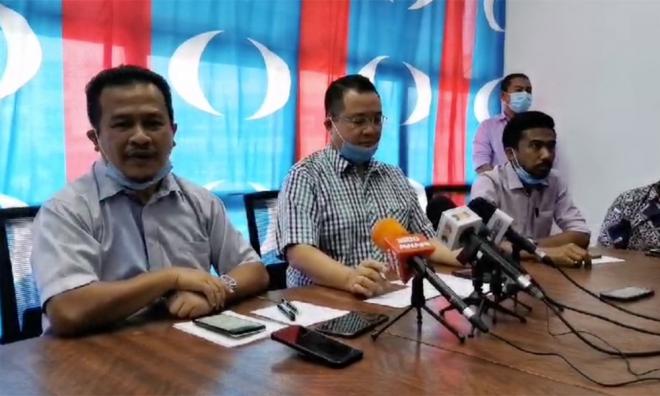
The defections by two Kedah representatives yesterday has highlighted the urgent need for recall elections, where voters can remove an elected official from office through a direct vote before their term is over, says electoral watchdog Bersih.
In a statement today, Bersih urged Pakatan Harapan and its ally Warisan to commit to introducing recall elections if they return to power and implement this mechanism in Selangor, Penang and Sabah where they still rule, after seeing defections within their parties.
“In the short run, only recall elections can prevent parties being constantly weakened by defection driven by personal gains as kingmakers who enthrone the next government, whether at the federal and state levels.
“An anti-hopping law, which many Malaysians call for, is instead not a working solution,” it said.
Yesterday, Sidam assemblyperson Dr Robert Ling Kui Ee and Lunas assemblyperson Azman Nasrudin announced their resignation from PKR to become independent representatives. They had also pledged their support for the Perikatan Nasional government.
Their defection also effectively caused the collapse of the Harapan state government in Kedah.
Bersih said such defections driven by personal gains in the change of government not only undermine political parties, but also the legitimacy of the political system.
This is especially true if voters cast their votes based on the political party with the next government in mind, so such defections make elections hollow, it said.
Bersih also said recall elections are the best institutional remedy against party-hopping as lawmakers who are rejected by a sufficient number of constituents through a collection of verified signatures will have to face another election where all constituents can decide if the representative should be retained or sacked.
If a recall motion is carried, then a by-election will be held, it explained.
“It works like an anti-hopping law on those defectors whose crossover is rejected by their voters.
“Unlike anti-hopping laws, recall elections empower lawmakers to leave their party or to defy party leadership to stand up for public interest if their actions are supported by the constituents,” Bersih said.

Meanwhile, it said anti-hopping laws are a “problematic remedy” which may not survive a judicial challenge.
For an anti-hopping law to be effective, it must disqualify not only lawmakers who voluntarily leave their party, but also those who are sacked by their party, Bersih said.
“This potentially turns lawmakers into puppets of their party leadership to avoid losing their seats if the latter acts against public interests.
“For single-party or single-block governments with a simple majority, anti-hopping laws will tame government backbenchers into government cheerleaders and effectively ensure that the legislative becomes the rubber stamp of the executive,” it said.
One such anti-hopping law introduced in Kelantan has already been declared unconstitutional by the Supreme Court in 1992 for infringing lawmakers’ right to freedom of association, which is enshrined in Article 10(c) of the Federal Constitution.
“The true remedy to party-hopping without crippling the legislative and undermining parliamentary democracy is strengthening political parties.
“If parties are strengthened, crossovers of lawmakers will not be endemic.
“It may still happen because of genuine differences over policies and ideologies, which is legitimate in a multi-party democracy, but not because of material gains,” Bersih said.
Two institutional reforms are required in order to strengthen parties in a “patronage-plagued” society like Malaysia, it said.
Firstly, it said, there must be fair treatment of all political parties and their lawmakers so they will have little to gain from switching sides, such as appointments to lucrative positions, granting of contacts, access to constituency development fund or even the withdrawal of criminal charges.
The second reform Bersih suggested is a "mixed-member" electoral system which not only gives individual mandate to each representative, as is the case under our current "first-past-the-post" (FPTP) system, but also a direct mandate to parties through the "party-list proportional representation" system.
Under the party-list proportional representation system, seats stay with the party and will be passed onto backup candidates if the lawmakers defect to other parties.
“This would reduce the prospect of regime change by the defection of a few FPTP representatives, whose mandates can be revoked with recall elections,” it said.
As such, Bersih said all parties that reject party-hopping and support the empowerment of voters should commit to bringing about recall elections.
“If Harapan is sincerely against party-hopping, their state governments in Selangor, Penang and Sabah have the moral obligation to introduce recall elections at the state level.
“As disqualification of state assemblypersons is a power of the state under the Eighth Schedule of the Federal Constitution, states can introduce amendments to the state constitution and necessary enactments to provide for the triggering and conduct of a recall election,” it said.

Bersih also noted that recall elections can and should be conducted by the Election Commission and that in the event of a successful recall, a normal by-election will be held.
“Political parties and their supporters should adopt a consistent and farsighted view on the issue of party-hopping, and not support it when it is in their favour and only oppose it when it is at their expense.
“Given the fluid political dynamics since 2008 and more so after February 2020, any short-term calculations may backfire in the medium and long term for parties when the tide changes.
“Recall election is good and necessary for political parties as it will protect them from the unwarranted switch of party affiliation but simultaneously allows political realignment that is consented by their constituents,” Bersih said. - Mkini



No comments:
Post a Comment
Note: Only a member of this blog may post a comment.